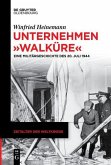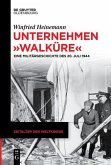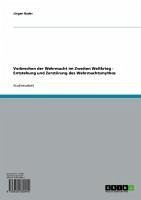The conspiracy has long been analyzed from political, social, religious, or moral points of view. This book asks what the military dimension of the plan was. What traditions in the German army were at work, how was planning and preparation done, and why did the plot fail eventually? What is more: how did the conspiracy affect the German armies created in East and West after World War II, and also the Austrian Army?
As the politicians among the conspirators thought in categories of Imperial Germany or at least the Weimar Republic, the officers among them were conditioned by the Reichswehr. Yet, Stauffenberg and some others were also bright intellectuals who were willing to incorporate their war experience into their plans, rendering them surprisingly modern at times.
The coup d'état had been planned as meticulously as circumstances in war-torn Berlin allowed. However, as most officers had foreseen, once it became public knowledge that Hitler had survived Stauffenberg's bomb, army units refused to act. The myth surrounding the "Führer" effectively prevented any military action against him.
Still, the failed uprising had its effects: the regime took the opportunity to tilt the balance of power further in favor of Himmler and his fiefdom (SS, Gestapo, Police), to the detriment of the army which Hitler felt was too reactionary anyway.
The leadership of the West German Bundeswehr always saw the failed uprising as part of its tradition, but it took time for this attitude to percolate down to the rank and file. For decades, some of the former Wehrmacht soldiers viewed Stauffenberg and his friends as "traitors".
The book is the first to approach this important event in German history from a specifically military point of view, and that results in some surprising new results.
Dieser Download kann aus rechtlichen Gründen nur mit Rechnungsadresse in A, B, BG, CY, CZ, D, DK, EW, E, FIN, F, GR, HR, H, IRL, I, LT, L, LR, M, NL, PL, P, R, S, SLO, SK ausgeliefert werden.
"Methodologically and argumentatively the ultimate in research on July 20, 1944."
Rainer Volk, SWR 2 (Broadcast)
"To have also taken a look at the post-history of the military resistance up to our days is what makes this book so extraordinary. It is not only the sum of a researcher's life, but also its crowning achievement."
Rainer Volk, SWR, 7/23/2019
"Heinemann succeeds overall convincingly in presenting [...] a competent [...] survey work that is also accessible to the broader public."
Alexander Gallus, Der Tagespiegel (Berlin Newspaper), 7/18/2019
"The author succeeds in drawing the connection between the idea of resistance and the lines of tradition of the Bundeswehr based on the Basic Law. With a detailed outline of the events that culminated in the assassination attempt of July 20, 1944, the work opens up access even to less knowledgeable readers."
Lea Wurzensberger, if. Zeitschrift für innere Frührung 63 (2019), 72
"Heinemann succeeds in a sovereign manner in processing the extensive research on the attempted coup d'état of July 20, 1944, and in further developing it with recourse to diverse archival sources. [...] Winfried Heinemann's work is without doubt a significant enrichment of research on July 20, 1944."
Hendrik Thoß, Historische Zeitschrift 310/2, 539
"'Unternehmen Walküre' fills a gap in German military historiography as well as in resistance research and can be recommended as a standard work."
Josef Blotz, Order. Journal of the Community of Catholic Soldiers, issue 12/2019, 48
"Clarity and impartiality of judgment attest to the historiographical significance for years to come of this indispensable overall account of the run-up to and environment of July 20, 1944, which, despite its focus on military history, illuminates the resistance in all its breadth, diversity, and contradictoriness."
Peter Steinbach, Zeitschrift für Geschichtswissenschaft 10/2020, 888









